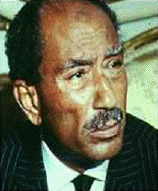October 6: The Death of Anwar Sadat
Anwar Sadat (d. 1981)
It was on this date, October 6, 1981, in an act of religious intolerance like that victimizing William Tyndale, that Egyptian president Muhammad Anwar al-Sadat (حمد أنور السادات) was killed by Islamic fundamentalist extremists in Egypt. Born on 25 December 1918, Sadat's political activities got him jailed at least twice. There he taught himself English and French. He succeeded his political ally, Gamal Abdel-Nasser, in 1970, after Nasser's military lost badly to Israeli forces in the Six Day War.
Initially vowing revenge, the Egyptian economy was declining without reliable support from the Soviet Union and Sadat realized that making peace with Israel would bring greater benefits to his country than making war. There followed the 1978 Camp David Accords and a peace treaty with Israel in 1979. For this Sadat won a Nobel Peace Prize in 1978. But there was a Muslim fundamentalist contingent that would not make peace for any reason, considered such overtures to the West a betrayal, and resented Sadat's crackdown on Muslim political dissent.
Sadat was assassinated during an army parade by members of the Egyptian Islamic Jihad organization. His successor, Hosni Mubarak, even though he was sitting just to Sadat's right, somehow escaped injury. But he continued Sadat's policy of using illegal arrests, torture and detention without trial to suppress radical Islamic groups (Mubarak was forced to flee Egypt on 11 February 2011 during the “Arab Spring”). But it could be argued that Anwar Sadat was killed because he was insufficiently intolerant.
Originally published October 2003 by Ronald Bruce Meyer.


